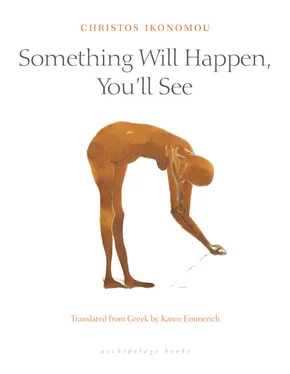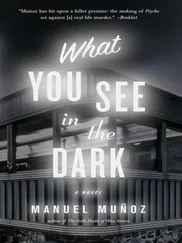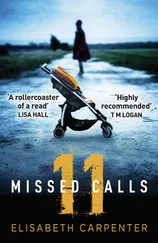Outside the darkness grows, the streets are empty, the windows moan in the wind.
He pushes his chair back and lights another cigarette. His face is lit for a moment by the flame of his lighter and then sinks back into darkness.
We look outside.
Immortal cabinets, Takis says and his voice seems to darken, too.
The light from the lamp is dimmer now, and there are no more shadows on the wall. In here, too, the darkness is spreading.
Immortal cabinets, he says.
Immortal cabinets.
AT NIGHT HE TALKS a lot to Lena. Vassilis. At night Vassilis talks a lot to Lena. Some things he says to put her to sleep and others he says to keep her awake. He doesn’t talk about the past, about the house that was lost or the job that was lost or the life that was lost. He talks about other things. Things far from them, foreign, exotic. The tallest buildings in the world and where they’re located. Which cities will be the largest in the world in the year 2050. What kinds of animals are native to Australia. The names of volcanoes in Alaska and Indonesia. Those are the kinds of things Vassilis tells Lena at night. Foreign. Exotic.
In the beginning, when they first moved to Nikaia, he would read her fairytales. Lots of fairytales, whole collections of them. From Crete, Thessaly, Epirus, Asia Minor. All kinds of fairytales. Goblins and trolls. The man in the moon. The tree of snakes. Misokolakis the half-made man. Dakris the man born of tears. The plane tree and the forty dragons. The boy raised by bears. Alimonos and the golden branches. The man made of wheat — his favorite. Fairytales from China, India, and South America, too. All kinds of fairytales. Two or three each night all night. All the fairytales he hadn’t read as a child he read to Lena on those nights. The stories helped them both. It helped them forgot their troubles for a while. Night can be a torture in troubled times. During the day things are clear, you know what to be afraid of. Work, bills, phone calls from the bank about overdue payments. But night is different. Night gets into your head. Even memories are frightening at night. They creep through the sheets like snakes. That’s how memories come in the small hours. And so they turned to fairytales. Vassilis read, Lena listened. Two or three fairytales each night all night until daylight came, until the balcony door shone with the gray light of day.
Later on they agreed to stop.
It’s not fair, Lena said. You always fall asleep before me.
• • •
On average we dream 1,460 dreams per year.
Each dream lasts an average of two to three seconds.
It’s impossible for human beings to lick their own elbows.
The human body contains enough iron to make a small nail.
The length of your thumb is equal to the length of your nose.
A woman’s heart beats faster than a man’s.
At an international conference on longevity in Melbourne, Australian professor of alternative medicine Mark Cohen announced that the rabbits he and his team pet every day at the lab live sixty percent longer than the rabbits they don’t pet.
Someone in the audience asked if the rabbits were real or Playboy bunnies.
November. Tonight it turned cold and a wind picked up. Vassilis slips a hand under the covers and touches Lena’s chest and rests his other hand against his own chest and tries to count their heartbeats. He counts the beats and counts the streetlights on the road across the way that he can see through the balcony door. It’s a road that slopes uphill full of curves which at night seems to vanish into the sky. Vassilis doesn’t know where that road goes. Sky Street — that’s what he calls it. Sky Street. He keeps saying they should go there one evening in the car to see where it starts and where it ends and count the yellow streetlights from up close but Lena says no. She doesn’t care what road it is or what it’s called or where it starts or where it ends. She doesn’t care about anything in Nikaia. We’re just passing through here, she tells Vassilis. We’re strangers here, passing through. Besides, it’s not much of a view, she says. No mountains or trees or sea. It’s all apartment buildings and utility poles. Not much of a view. I pity the people who live here. But for us it’s fine. We’re just passing through. Isn’t that right? Tell me, I need to hear it. Tell me we’re just passing through.
He slowly pulls his hand away from Lena’s chest and slowly sits up and looks outside. Two eucalyptus trees on the street below, branches joining and parting as the wind blows. Eucalyptus trees. Not native to this place but they still put down roots. Every night he looks at the trees and counts the lights on the street that seems to vanish into the sky. And every night he loses track but he never gives up. That’s how Vassilis spends his nights. Counting lights, looking at trees, talking to Lena — to put her to sleep or to keep her awake. And in the morning at work the others see that he’s white as a sheet from lack of sleep and they laugh.
What’s up, Bill? Were you screwing Snow White again last night?
Lena lifts her head and looks at him.
Are you counting streetlights again? she asks. I don’t like that street, I told you. The way it ends so abruptly. We’re never going there, understand? Never.
• • •
Strange how things sometimes turn out. You grow up and experience things and read books and get to know people and places and arrive at an age that you used to believe in, and in the end it seems that everything in life is a matter of luck, that your life and everyone’s life is a small inside-out universe through which everything moves blindly and without purpose, a universe without a god, without rules, without purpose — chaos. And then something happens to shake that belief and you start to wonder whether you might have made a mistake, if there might in fact be something that gives meaning to the chaos, if there might be some secret thread that ties everything in your life together, a secret thread that ties your life to the lives of others. And you get scared. You get scared because while it might be truly frightening to live in chaos it’s twice as frightening to know that you live not in chaos but in a world with laws and rules that you yourself will never learn, that you’re incapable of learning — no matter how hard you try, you’ll never find that thin secret thread, never grasp it, never find the thing that has both beginning and end.
When the house burned down Lena was twelve weeks pregnant.
No one ever knew if the stars were to blame for what happened, if it was the solar eclipse in June or Pluto which had been ascending since April. Lena’s sister had won three hundred thousand euros in the lotto and decided to give up the bookstore and live her life, travel to improbable places — Alaska, Kenya, Peru. She’d always believed that there are two ways for a person to learn about herself and the world: by reading and by traveling. Books and travel. After twenty years of books now she had the opportunity to travel wherever she wanted, to get to know people, places, smells, tastes. Wasn’t it incredible? She was crazy with joy. She was almost ready to believe that there is a god after all even if she would never admit it to anyone but them — her friends would make fun of her for sure. They would get mad at her, the way they did once when she said that if we call god a human creation then whoever turns against god is turning against people, too — which must mean that atheists are all misanthropes? She’d only told her sister and Vassilis. There might be a god after all, she said. She told them she wanted them to take over the bookstore and move into her house which was next to the bookstore and look after it too. They wouldn’t have to pay a cent, not even the bills.
Читать дальше












